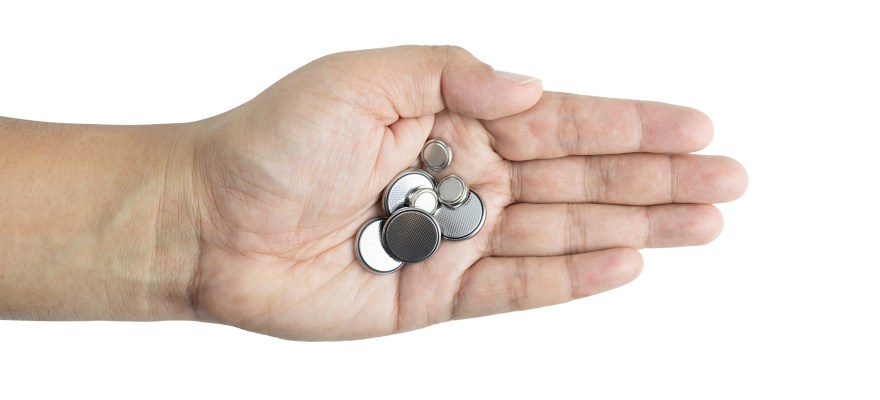
Lithium Coin Batteries: What Parents Need to Know
Accidental ingestions of small batteries – like lithium coin batteries – are on the rise among young children, with the rate of battery-related ER visits for kids doubling over the past decade.
While many kids accidentally swallow coins, swallowing these coin-shaped batteries causes a particular danger in that they can cause immediate and severe injury.
There are now approximately 7,000 battery-related emergency department visits among kids in the United States each year. Although this is an alarming number, there are many ways parents can prevent their child from becoming part of this statistic.
First, it’s good to take a look at why there might be an increase. The rise in accidental ingestions of these batteries could be due to technological advancements that make house-hold devices easier and more convenient to use.
“As technology progresses, devices tend to get smaller. And therefore, the technology that powers those devices also gets smaller,” Tanya Altmann, MD, FAAP, a UCLA-trained pediatrician, explained. “And kids are using more devices and are around more things that could potentially contain dangers.”
What are Lithium Coin Batteries?
So, what exactly are these things? Lithium coin batteries are small, disc-shaped cells about the size of a nickel (20mm). They’re quite useful and convenient, and can be found in many household items, including key fobs, remote controls, thermometers and other devices
But as parents know, kids can be very curious, and will put things in their mouths that they shouldn’t. In fact, a recent survey by battery company, Duracell, showed that 64% of parents surveyed have had to stop their child from putting something hazardous in their mouth.
RELATED: How to Safely Store e-Bikes and e-Scooters
How can Lithium Coin Batteries Hurt a Child?
If swallowed, lithium coin batteries can become lodged in a child’s esophagus. Unlike ingesting something like a penny or other coin, there’s no time to wait for the hazard to “pass” through the child’s digestive system. A trip to the ER is immediately needed, as severe burns and life-threatening complications can occur if the battery isn’t removed within two hours.
Here’s a look at what happens: When the battery is swallowed, it can get stuck in the esophagus. According to the Children’s Hospital of Philadelphia, saliva triggers an electric current that causes a chemical reaction that can severely burn the esophagus in as little as two hours, creating an esophageal perforation, vocal cord paralysis or even erosion into the airway or major blood vessels.
“So you have the size of the item and the fact that it is a battery. Those combined is what makes it so dangerous,” Altmann, who recently partnered with Duracell on raising awareness about lithium coin battery safety, said.
Almost always, the battery has to be surgically removed. If a parent reports that a lithium coin battery has been ingested, time is of the essence, Altmann said, and it has to be removed as fast as possible.
What Battery Companies are Doing to Help Prevent Injury
When it comes down to it, kids will most likely spit something out of their mouth that doesn’t taste good. That’s why Duracell is now applying a non-toxic bitter coating to its lithium coin batteries. Each battery has a layer of denatonium benzoate, one of the most bitter substances on Earth.
According to Duracell, the substance is completely safe if consumed and is meant to deter kids from swallowing the battery in the first place. (You can read more about the non-toxic substance and important battery safety information and tips at Duracell’s #BitterIsBetter page.)
Energizer, another popular battery maker, takes precautions, too, against accidental battery ingestion. The company’s lithium coin batteries come in child-resistant packaging, and it offers safety tips and information for parents on its website.
Check out this battery safety PSA starring musician and dad, Lance Bass:
How To Keep Kids Safe
As much as curious kids love putting things in their mouths, there are some things parents can do to reduce the risk of accidental coin battery ingestion.
- Find out which devices in your home contain lithium coin batteries, and store them away from and out of reach of kids.
- Inspect the devices for any that don’t have a screw on the battery compartment, and seal them with tape for an extra layer of protection.
- Remove expired batteries. Place them away safely and out of reach of kids until you can recycle them properly.
- Choose batteries with safety features such as non-toxic bitter coating designed to help discourage swallowing, and child-secure packaging that makes it almost impossible to open without scissors.
- If you suspect that your child has ingested a lithium coin battery, take him or her to an emergency room immediately. If you aren’t able to drive, call 911 for help.
For more information about lithium coin battery safety, visit poison.org.
Wanna read more stuff like this? Get our newsletters packed with ideas, events, and information for parents in Staten Island.

